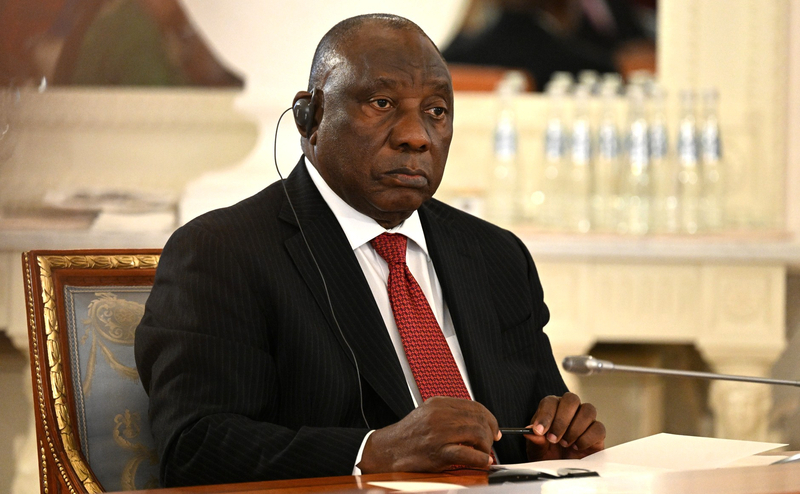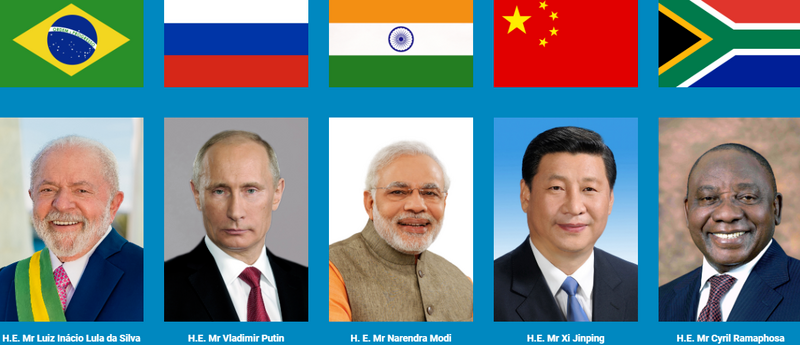At 17 March the International Criminal Court issued a warrant of arrest against Vladimir Putin for alleged complicity in war crimes against Ukraine. Moscow shrugged it off, not recognising the ICC. But Putin failed the first litmus test: the South-African president Cyril Ramaphosa dissuaded him to come to the BRICS-summit in Johannesburg (22 till 24 August). It is a slap in the face for Putin and gives credit to ICC and South Africa, says legal expert Sergey Vasiliev of the University of Amsterdam. Elites might wonder what use is a leader who is isolated from the world.
 South-Africa president Cyril Ramaphosa in Saint Petersburg in june 2023 for peace talks with Ukraine (picture Kremlin)
South-Africa president Cyril Ramaphosa in Saint Petersburg in june 2023 for peace talks with Ukraine (picture Kremlin)
by Sergey Vasiliev
Last week, the office of the South African President Cyril Ramaphosa announced that Vladimir Putin—who is sought by the International Criminal Court (ICC) on war crime charges—would not attend the 15th BRICS Summit to be hosted in Johannesburg next august in person. ‘By mutual agreement’, the communiqué put euphemistically, Russia would be represented by Russia’s foreign minister Sergey Lavrov instead.
An agreement in name only, this unhappy compromise was preceded by months of tense negotiations between the two countries. With BRICS being an international prestige project for Putin, Russia kept insisting on his personal attendance while also demanding ironclad guarantees of his non-arrest. But South Africa demurred: it would much rather receive someone it could afford not arresting without violating its obligations as the ICC state party. 'We would be happy if he doesn’t come,' South African Deputy President Paul Mashatile admitted.
In parallel, South African authorities consulted with the ICC trying to persuade it to legally allow them to host Putin and ignore the warrant. 97 meetings with the Court officials later, the contrived arguments that arresting Putin would not only undermine South Africa's peacemaking efforts but also, as stated in President Ramaphosa's (at first confidential) affidavit to the North Gauteng High Court in Pretoria, be tantamount to a declaration of war against Russia, proved to be of no avail. (It bears noting that no such declaration had in fact been issued: it was rather a hyperbole and an inference drawn from the deputy chairman of Russia’s Security Council Dmitry Medvedev’s response to German Justice Minister Marco Buschmann, who assured of Putin’s arrest if he were to visit Germany).
ICC didn't back down
Be it as it may, the ICC rightly and understandably did not back down. The South African authorities then tried to explore alternative solutions with other BRICS members but their attempts to move the summit to China, a state not party to the Statute, ultimately fell through. Political commentators and justice monitors have been speculating since March whether Putin would dare to make the trip, but the die seems to have been cast in late June: Putin would not be attending the summit in person.
 BRICS members
BRICS members
'Like many other states, Russia does not recognize the jurisdiction of this court and, therefore, its decisions are null and void for the Russian Federation from the legal point of view', stated press-secretary Peskov defiantly in reaction to the ICC’s announcement of an arrest warrant against his boss and children’s rights ombudswoman Maria Lvova-Belova, alleging their responsibility for the war crimes of unlawful deportation and unlawful transfer of Ukrainian children. 'Russia does not cooperate with this organ, and any possible "recipes" for arrest coming from the international court, will be legally invalid for us', echoed Peskov the spokeswoman of the Ministry of Foreign Affairs, Maria Zakharova.
But behind all the denial and bluster by Russian authorities loomed unease and even shock at the reputational damage to Putin personally and to the institute of the presidency. The anxiety about the real-life consequences of the warrant issued by ‘this organ’, in particular the risk of Putin ending up in the dock in The Hague, was palpable. So much so that Medvedev—the former ‘liberal’ president-turned-hawk and a somewhat comical figure in Russia’s wartime political landscape—threatened ICC judges, in a characteristically obscene manner, to hit the Court’s premises with no less than a supersonic missile launched from the North Sea. Russia’s Investigative Committee put the ICC Prosecutor Khan and Pre-Trial Chamber judges responsible for issuing the warrant, on the wanted list, by way of a ‘mirror response’.
The symbolism of the ICC warrant circulated against a head of the state waging an imperial war of aggression in which countless international crimes have been committed at his behest, was never lost on the observers. Indeed, Putin’s post-17 March international status changed to that of a war crime suspect and fugitive from international justice – at least until such time that he appears in The Hague to clear his name.
Russia's anxiety about the consequences of Putin ending up in the dock in The Hague was palpable
Yet, the practical implications of the warrant have been far from certain. The ICC has no police force of its own and relies on states parties for enforcing its decisions. Putin could refrain from travelling to ICC states, which would be obliged to execute the warrant, – or, worse still, he could make the Court look like an impotent non-entity, by compelling those states to uphold his personal immunity over their statutory obligations towards the Court.
Enter Ramaphosa
There was a chance that Russia might find just such a renegade state party in its BRICS partner South Africa whose executive’s commitment to the ICC was rather patchy in the past. The BRICS summit it will be hosting in August was to become a litmus test for the ICC’s authority – and for Putin’s ability to defy it. It must be recalled that in June 2015, South African government allowed the then-President of Sudan Omar Al Bashir, an ICC suspect, to make a narrow escape from Johannesburg, where he was attending the African Union assembly.
This led to the ICC’s ruling condemning South Africa’s failure to arrest Al Bashir as non-compliance with its state party obligations. Subsequently, the Gauteng High Court’s decided that the government had violated the 2002 domestic act implementing the ICC Statute. In October 2016, the government filed a notice of the intention to withdraw from the ICC Statute to cut this Gordian knot, but the High Court found this move to be ‘unconstitutional and invalid’, ordering the revocation of the notice.
Given this haunting precedent, the South African government was keenly aware of its legal obligation to arrest Putin and wanted to prevent this affair from turning into Al Bashir no. 2, as the outcome of its consultations with the ICC under Article 97 of the Statute also required. In the 21 July 2023 settlement in the case brought by the opposition party Democratic Alliance against South Africa’s President, the Gauteng High Court recorded the respondents’ commitment to formally apply for a domestic arrest warrant for President Putin. The fact that the Department of Justice has already requested the Office of National Director of Public Prosecutions to issue the warrant makes it as good as certain: should Putin set his foot in South Africa, he will be detained.
Boost for ICC and South Africa
Why is this excellent news for international justice and the rule of law in South Africa and internationally? First, these developments help reaffirm the ICC’s credibility and preserve the integrity of the Rome Statute system. They go a long way to dispelling the notion that the Court is non-entity and that people like Putin should feel free to snub it and travel to countries that are its members without fearing arrest. In other words, the ICC not just buzzes but also stings.
The finalized format of the 15th BRICS summit is evidence that ICC arrest warrants do have impact on the international standing—and itineraries—of the powerful heads of states subject to them, even if they are leaders of the permanent members of the UN Security Council not party to the Statute. Putin’s fear of (attempted) arrest is real, and his aborted trip attests that states like South Africa take the Court, its rulings and the mandatory consultations under Article 97 Statute very seriously.
In other words, the ICC not just buzzes but also stings
Second, the South African government was admittedly between a rock and a hard place in the Putin affair and in a double bind between its obligations towards the Court and its loyalty towards a BRICS partner. Although its position was unenviable as a matter of foreign policy, it could have handled this situation in a more principled way from the outset and be more assertive with Russia. Apparently, it also felt the need to hold almost a hundred meetings with the ICC and publicize the fact afterwards, if only to show Russia they really did try.
Fortunately, South Africa’s democratic institutions, independent judiciary and civil society stood the test and proved strong and principled enough to perform their role in compelling the executive to uphold the rule of law and demonstrate its respect for international justice. South Africa should be credited for choosing the path of honoring its obligations as the ICC state party, however difficult it might seem.
The ‘mutual agreement’ was also its diplomatic win. This compromise allowed parties (except for Putin personally) to save face in the least awkward and legally costly way possible. South Africa now neither has to execute the ICC warrant or face non-compliance rulings from the ICC in the future; nor does it have to disinvite Putin formally from the BRICS summit.
Third, in what may sound like a counter-intuitive conclusion, this outcome is good for Russia (but not for Putin), even though for Ukraine (and for the democratic Russia of the future), the execution of the warrant in South Africa or elsewhere would have really been the best-case scenario. Yet for now, Russia avoids the embarrassment of its president getting arrested or chased out of the country like Al Bashir in 2015.
The invitation to attend the BRICS summit getting rescinded would have also been more uncomfortable than the rather sparing 'mutual agreement' formula. The Russian state propaganda can still spin this outcome to the public as if ‘Putin just decided not to go’. But it is clear that he was simply left with no other option: the ‘all-powerful’ president had to change his travel plans since he could be arrested upon arrival in South Africa.
Elites and citizens might wonder whether an isolated Zoom-president is the best ruler they can have
The significance of such perceptions should not be underestimated. Putin is now the only BRICS leader to give up his personal participation in a high-profile forum because South Africa essentially refused to host him. The Russian elites and the public at large are not blind to the fact that, 17 months into the full-scale war in Ukraine, their president has turned into a friendless outlaw and an outcast even among allies – so inconvenient and toxic a figure that even Russia's closest partners prefer to keep him at an arm’s length.
The stranded Putin will still connect to the Johannesburg summit via video-link but the president forced to conduct his country’s international relations by Zoom can convey anything but power and grandeur on the international stage. And as the world is shrinking for their ‘irreplaceable’ leader, the elites and average citizens alike are bound to wonder whether an isolated Zoom-president is the best ruler they can have.
The next year’s BRICS summit is set to take place in Brazil – also an ICC State Party. The script of the first episode in the ICC v. Putin saga has been written, and we will see it play out in Johannesburg next month. But we are far from the finale yet.
Sergey Vasiliev is Associate Professor, Faculty of Law, University of Amsterdam
